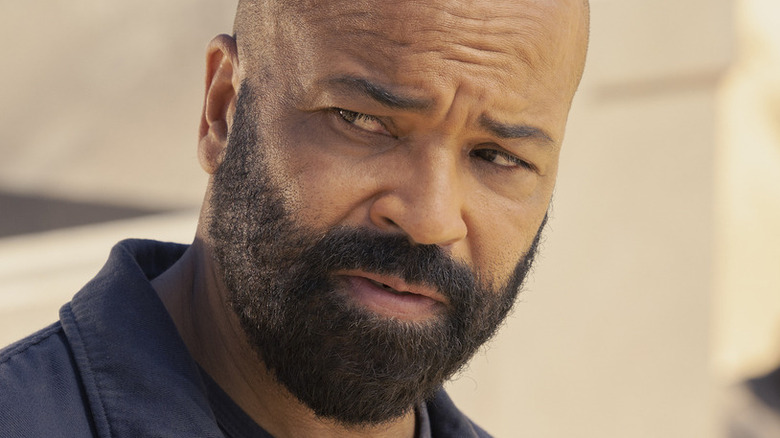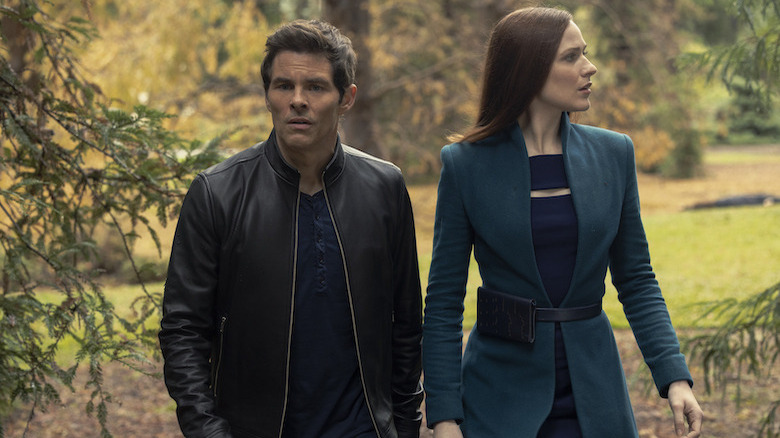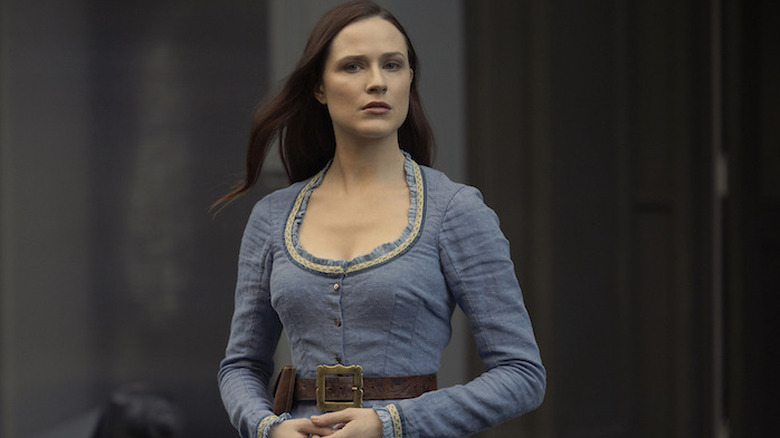Westworld's Cancellation Means The Show Will Never Close Its Final Loop
The following article contains spoilers for the "Westworld" television series.
With the sudden cancellation of HBO's "Westworld" series, fans have lingering questions that will never be answered. The one big question that will never be answered is simply, what does the ending of Season 4 mean? At the end of Season 4, which aired in August 2022, fans weren't sure if they were getting a series finale. Star Ed Harris even suggested to The Hollywood Reporter that the series was going to be filming again in the spring of 2023. Now, with the official cancellation of the show coming from HBO, fans are left with an open-ended conclusion to interpret.
The (now) final episode of the series begins with the human race reaching near extinction. They are killing each other with no regard after the plan William (Ed Harris), who has also died, has set into motion. This leads to the death of Maeve and Bernard, played by Thandiwe Newton and Jeffrey Wright respectively, in the previous episode. Ashley (Luke Hemsworth) is killed off by Angela Sarafyan's Clementine, who is also killed off, and later, Caleb (Aaron Paul) and Charlotte (Tessa Thompson) are believed to be dead as well in the finale. By the end, most of the main characters of the show have been killed off.
Dolores (Evan Rachel Wood) goes to the Sublime, the world created for hosts to live without humans, and simulates one last game. She recreates the original "Westworld" theme park, for a final second chance at whether humans can — or really deserve to — survive extinction.
The ending of Westworld suggests either a restart or a time loop
This open-for-interpretation ending basically presents two possible outcomes for the show. One outcome is that Dolores gives humanity one last chance to live through the simulation, and everything that has happened to this point has been real and most of the cast is dead. They would only be brought back as simulations in the Sublime. The other interpretation is that the show is something of a full-circle loop in which everything we have seen to this point in the four seasons has been Dolores' simulation and the ending of Season 4 takes the audience right back to the beginning of Season 1, which was the original simulation.
If the series is a loop, it is Dolores — or a previous version of Dolores — seeing if humans and hosts can co-exist, and the audience knows it ends apocalyptically. The other interpretation is a somewhat hopeful one that humans and hosts have one more chance to get it right. With that prospect, Season 5 would have been a version of Season 1, but with the 5th season no longer happening, fans are left with the lingering question presented by the ending. Is humanity doomed, or will a rebirthed cast have one more chance? Audiences will never know.
The unanswered questions of the finale left audiences divided
If the series is a loop, every character is Dolores' memory of that character and they have all been hosts all along. If it is interpreted as a rebirth, each character will now be a host based on Dolores' memory of them and therefore it will not be a true rebirth. Every character will simply be an extension of Dolores. Again, we will never know. Even the episode's title isn't an indication of what the truth is. The episode is titled "Que Sera, Sera," which simply means "whatever happens, happens." Not a lot to extrapolate from there.
The finale split fans and critics when it aired back in August. For example, Forbes remarked, "Host or human has all blurred so completely that all we're left with is page after page of smudges" in its review of the finale. Meanwhile, Vulture wrote, "In wrapping up an increasingly bleak (and fun!) two months of television, the season-four finale of 'Westworld' set the pieces for what is sure to be an even goofier season five." While fans won't be getting that "goofy" Season 5, it appears what they're left with is a season finale they can debate all the way until our simulation restarts.


